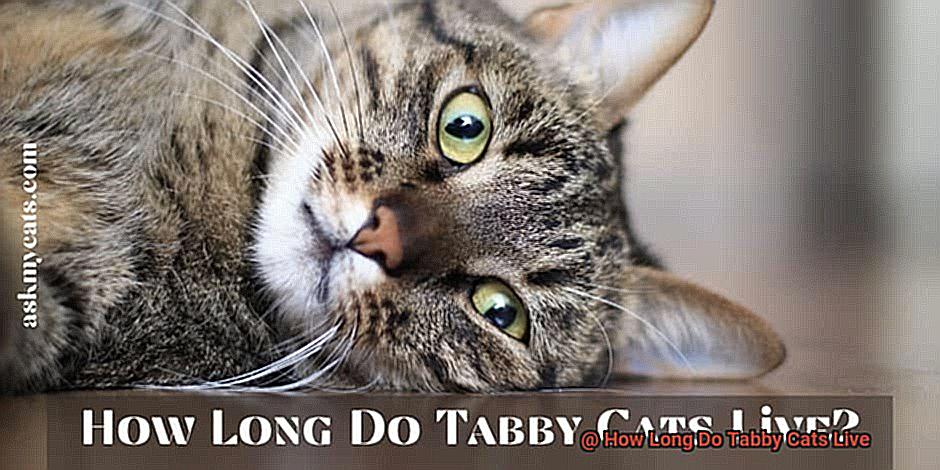Are you considering bringing a tabby cat into your home, but wondering how long they typically live?
As an expert in feline wellbeing, I’m here to provide you with all the information you need. First things first, it’s important to note that tabby cats aren’t a specific breed – rather, they’re identified by their unique coat pattern.
Tabby cats can be found in many breeds, including domestic shorthair and Maine Coon cats, which means their lifespan can vary based on several factors. In this blog post, I’ll delve deeper into what influences the lifespan of tabby cats and share some tips on how to help them live a long and happy life.
You’ll learn about genetics, diet, lifestyle, and other key factors that play a role in your furry friend’s lifespan. Plus, I’ll answer common questions about tabby cats – like whether they’re prone to certain health problems or why they make such popular pets.
Keep reading to discover everything you need to know about ensuring your tabby cat lives a healthy and fulfilled life by your side.
Average Lifespan of Tabby Cats
Tabby cats are beloved for their playful personalities and striking coat designs.
But how long do these feline friends typically live? While there are no hard and fast rules when it comes to cat lifespans, several factors can impact a tabby’s longevity.
On average, tabby cats live from 12 to 16 years. This lifespan can be extended if cats receive proper care and attention.
Indoor tabby cats generally live longer than their outdoor counterparts because they aren’t exposed to the same environmental dangers and diseases. With the right care, indoor tabbies can even reach ages of 15 to 20 years.
Gender also plays a role in a tabby’s lifespan. Male tabby cats have a slightly shorter lifespan than females because they tend to roam, fight with other cats, and suffer injuries and infections that can shorten their lives.
Males are also more susceptible to certain health issues such as urinary tract infections and blockages. However, neutering male tabbies can help prevent these problems and increase their lifespan.

The color of a tabby’s coat may also impact its lifespan. Orange tabby cats, for example, may be more prone to skin cancer and obesity.
However, on average, orange tabbies have a similar lifespan to other tabbies: 12 to 16 years. Finally, it’s important for cat owners to provide their furry friends with proper care, regular vet check-ups, and a safe living environment.
Indoor-only tabbies tend to live longer than indoor-outdoor cats because they aren’t exposed to the same dangers outside. While indoor-outdoor cats may have a slightly shorter lifespan, they can still live up to 15 years or more with proper care.
In conclusion, the lifespan of a tabby cat is influenced by several factors such as gender, color variation, indoor vs outdoor living, and overall health and care. As a cat owner, you play a key role in ensuring your furry friend has a long and happy life.
Factors Affecting a Tabby Cat’s Lifespan
Firstly, genetics can play a significant role in determining a tabby cat’s lifespan. Certain breeds may have a higher risk of developing health conditions that can shorten their lifespan.
For example, Maine Coon tabbies are generally healthy and long-lived cats, while other breeds may have a predisposition to heart disease or cancer. As responsible pet owners, it’s essential to research the breed you want to adopt and learn about any potential health risks they may face.
Another crucial factor that can influence your tabby cat’s lifespan is their environment. Indoor cats typically live longer than outdoor cats due to the reduced risk of accidents, injuries, and exposure to diseases.
Although outdoor cats enjoy the freedom of roaming about, they are also vulnerable to various dangers, such as traffic collisions, attacks by other animals, and environmental contamination. Nutrition is also crucial for maintaining your tabby cat’s overall health and increasing their lifespan.
Feeding your cat a well-balanced diet that meets its nutritional needs is vital. A diet rich in protein sources such as chicken or fish, healthy fats, fiber, and vitamins and minerals will help prevent obesity-related health issues.
Avoid feeding your cat canned foods with chemical additives or fillers that can be harmful. Regular veterinary checkups and preventive care are vital for maintaining your tabby cat’s general wellbeing.

Early detection and treatment of any health problems can significantly extend their lifespan. Keeping your cat up-to-date on vaccinations, providing regular dental services, and ensuring they get enough exercise will also help them live long and healthy lives.
Indoor vs Outdoor Tabby Cats
The answer is not straightforward, as both options have their advantages and disadvantages.
However, there are some things to consider before making a decision. First and foremost, it’s important to note that indoor tabby cats tend to live longer than outdoor tabby cats.
This is because they are less exposed to various dangers outside, such as cars, predators, and diseases. Indoor cats can also avoid fights with other animals that may lead to severe injury or infection.
Additionally, they have a lower risk of contracting diseases from other cats or wildlife and are less likely to be exposed to toxins such as pesticides or poisonous plants. However, outdoor tabby cats have more opportunities for exercise and mental stimulation, which can lead to a healthier and happier life.
They can hunt prey or explore their surroundings, which can bring them a great deal of joy. But the risks associated with living outdoors should not be ignored when deciding whether to keep a tabby cat indoors or outdoors.
So which option is right for you and your feline friend? It all depends on your lifestyle and the environment around you.
If you live in a busy street or near predators such as coyotes or eagles, it’s safer to keep your cat indoors. However, if you live in a quiet neighborhood with no people or predators, your cat will enjoy the freedom of exploring the outdoors.
If you do decide to keep your cat indoors, there are some precautions you should follow. Regular vet check-ups, vaccinations, and flea control are crucial for keeping your cat healthy.
And if you want to provide your indoor cat with some mental stimulation, consider providing them with scratching posts or interactive toys. In conclusion, keeping a tabby cat indoors is generally safer and can lead to a longer lifespan.
But if you choose to keep your cat outdoors, it’s important to take precautions to ensure their safety and health.
Male vs Female Tabby Cats
One of the most common questions asked is whether there is a difference in lifespan between the two genders.
The answer is yes. According to a study conducted by the American Veterinary Medical Association, female tabbies tend to live longer than their male counterparts.
Male tabbies usually live for around 15 years, while female tabbies can live up to 17 years. Although several factors can influence a cat’s lifespan, such as genetics, diet, environment, and healthcare, gender does play a role.

Studies have shown that male cats are more prone to certain health issues than females. For instance, male cats are more likely to develop urinary tract infections, which can be life-threatening if left untreated.
Female cats, on the other hand, are more susceptible to specific types of cancer, such as mammary cancer. But don’t worry.
Regardless of gender, providing your tabby cat with proper care and regular check-ups with a veterinarian can help ensure a long and healthy life. This involves feeding them a balanced diet, giving them plenty of exercise and mental stimulation, as well as keeping up with vaccinations and flea control.
If you have concerns about your tabby cat’s health or have questions about their care, don’t hesitate to ask your veterinarian for advice.
Coat Color and Lifespan of Tabby Cats
Orange tabby cats tend to live longer than other tabby cats. On average, an orange tabby cat can live for up to 15.9 years, whereas gray tabby cats have an average lifespan of 12.1 years.
It’s intriguing to think that coat color may hold the key to a cat’s longevity. While the reason for this correlation is not yet fully understood, researchers believe that genetics may play a significant role.
Some genes that control coat color may also impact other aspects of a cat’s health and longevity. For example, certain genes may make cats more susceptible to particular health disorders or improve their immune systems.
However, it’s essential to remember that these findings are based on averages, and individual cats can have vastly different lifespans regardless of their coat color. Other factors such as diet, exercise, and medical care can also greatly impact a cat’s lifespan.
So, what can tabby cat owners do to ensure their furry friends live long and healthy lives? Providing them with the right care and attention is crucial.
Regular check-ups with a veterinarian and a balanced diet can go a long way in keeping your cat healthy. In conclusion, while coat color may not be the most significant factor in determining a tabby cat’s lifespan, it’s still fascinating to note that there could be some correlation between the two.
JTWtBRLrGhs” >
Ensuring a Long and Healthy Life for Your Tabby Cat
Firstly, providing your tabby cat with a balanced and nutritious diet is essential.
This means feeding them high-quality cat food that contains all the necessary vitamins and minerals they need to thrive. Avoid giving them table scraps or human food as this can lead to obesity and other health issues.

Regular exercise is also crucial for your tabby’s health. Indoor cats may not get as much exercise as outdoor cats, so it’s important to provide them with plenty of opportunities to play and stay active.
Toys, scratching posts, and climbing trees or shelves are great ways to keep your cat entertained while helping them stay active and healthy. Another vital aspect of ensuring a long and healthy life for your tabby cat is regular veterinary checkups.
These checkups can help detect any underlying health problems early on before they become more serious. Your veterinarian can also provide you with advice on how to maintain your cat’s health and well-being.
Your tabby cat’s living environment is also important. Ensure they have access to clean water at all times, a litter box that is cleaned regularly, and a cozy bed or sleeping area where they can rest comfortably.
This will help them feel safe, secure, and content in their surroundings. By following these tips, you can help ensure that your tabby cat lives a long and healthy life.
Remember that keeping your feline companion happy and healthy requires ongoing care and attention, but the rewards of having a happy and healthy cat are well worth the effort.
Also Read: Maine Coon Tabby Mix: Everything You Need to Know

Conclusion
In the world of feline companionship, tabby cats are a beloved breed.
But how long do they typically live? The answer is that it depends on several factors.
Genetics, diet, climate, gender, and general health and care all play a role in determining a tabby cat’s lifespan. As a responsible cat owner, it’s crucial to provide your furry friend with proper care and attention to ensure a long and happy life.
One way to do this is by keeping your tabby indoors as much as possible. Indoor cats have reduced exposure to environmental hazards and diseases, which can help them live longer than their outdoor counterparts.
When it comes to gender, male tabbies tend to have slightly shorter lifespans than females due to their tendency to roam and engage in fights with other cats. However, neutering male tabbies can help prevent these issues and extend their lives.
Interestingly enough, the color of a tabby’s coat can also impact its longevity. On average, orange tabbies tend to live longer than other tabbies.
To keep your tabby cat healthy and thriving for years to come, make sure they receive a balanced diet, regular exercise, veterinary checkups, and a clean living environment.







